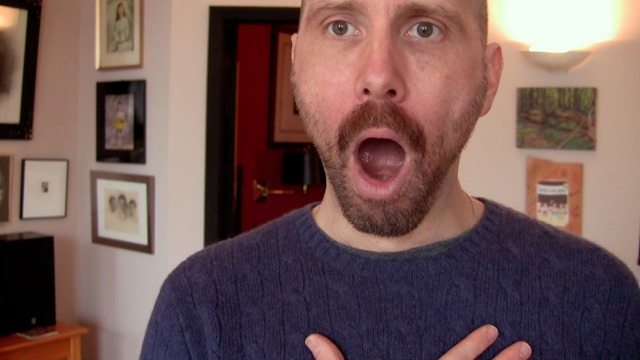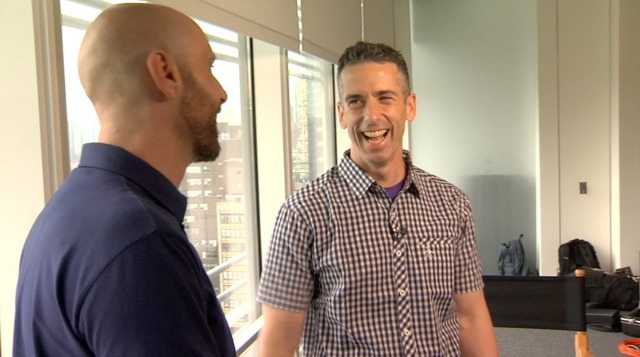

David Thorpe is the director of the highly celebrated documentary, Do I Sound Gay, a filmic essay that explores insecurities some gay men have about their voices, where those voices come from, and what the stigmas are around them. The film is a sheer delight to watch and brings to light important social issues as well as an array of fascinating linguistic theories (Read our review here) We recently sat down with Thorpe to talk about his project in more detail, and unsurprisingly he’s just as delightful as his film.
You mention in the film that you work as a writer, can you talk about why you turned to documentary filmmaking and how the process of making this film has affected your writing?
Well, I actually have not been a writer for a while. I was a writer and an editor for many years and I left that to be a Communications Director at Housing Works, the AIDS organization, although I continued freelancing to some degree. So I was both a journalist and a communications professional, but it was while I was at Housing Works that I started to work on the film. Eventually I went part time to work more on the film and then eventually I left. So the short answer to your question is, I haven’t been writing because I’ve been too busy making the film. Although, I would still love to get back to it.
Well it’s an interesting and successful career transition. You talk a lot about relationships in the film, first starting off with your breakup and then mentioning many of your friends who are in long term relationships. If it’s not too private, I’m wondering if your personal transformation changed the way you approached dating or relationships in general.
Well, I’m still single but I’m not miserable about it. I’m actually much more confident than I was, and I feel much more open to dating, so I think that’s been a big change. And in my day to day life, I feel a lot closer to my family and friends. The film is really about me turning to them for support at a time when I was feeling vulnerable. And they stepped up so beautifully, I really feel like we all went through this together. There’s so many friends and family in the film that it was also an experience for them. And my mom, you know she’s a proud Jewish mother, she can’t brag enough about it.
I love that. Do you feel like your friends and family learned more about you through this?
They definitely learned much more about me and I learned much more about them! You know, one of my best friends Sam, who’s in that scene at the dinner party with the mustache, we’ve been close friends for many, many years and I had no idea that he had struggled to accept his voice. And I didn’t know that Alberto, the other friend in that scene, has what he calls a “generalized self-loathing” about being gay. We just never talked about that stuff. So I definitely feel a million times better letting go of that weight, knowing I wasn’t alone in having some shame.
You make an interesting point and this actually leads me to a question I have about David Sedaris, who to me, out of everyone you interviewed in the film feels like the celebrity who’s the most comfortable in their “gay voice.” So, when he talks about his shame, I felt it was especially moving. How was that discussion for you?
The day I interviewed David Sedaris was really a milestone for me. Not just because I got to meet David Sedaris, but finding out that he understood so much of what I was feeling, and hearing him say that sometimes he feels good when people think that he’s straight, you know it made me feel less silly for having those feelings myself. In a funny way I had shame about being ashamed. I felt guilty that I didn’t always love myself for being gay. So that was a really big deal for somebody as successful in life and in his career to admit some of those feelings of shame. And also to wonder where they came from, why they were still with him after all this time.
One of the linguists in the film suggests that gay men put more weight into the cues they take from women rather than men as a trend, and therefore adopt their “gay voice.” I am interested to hear your opinion on that based in your experience.
Well, I always like to remind people that there is no such thing as the fundamentally gay voice, and it’s not just gay men who might take cues from their mothers. In fact, in the film, you meet a straight guy who, in all likelihood, acquired his speech patterns from women. So what’s important to remember is that while there is no such thing as a “gay voice,” there are men who sound more or less stereotypically gay, or effeminate. So I think that the linguistic theory that men who sound gay pick up cues from women in their lives is totally plausible. I have a lot of mannerisms that my mothers has. But that’s not to say that it’s the case for everyone. As you know the film also talks about the influence of communities. So it’s really hard to sort out why exactly someone sounds more stereotypically gay at any moment, especially because of course we also code switch so we may try to sound more professional or more masculine, or we might sound gayer depending on who we’re with. So I think one of the things that’s important to remember is that categories for the most part are false.

Speaking of code switching and now that you have more of an ownership over your voice, do you ever find yourself purposefully code switching?
[laughs] I never purposefully code switch! I think now that I found my balance and my confidence again I’m usually just me. When I do code switch, it’s usually just because I’m adapting to the group that I’m in. But I can’t lie, there are times when I feel vulnerable that I try to, you know, butch it up. And when I do I just kind of chuckle to myself and go right on trying to be as truthful as I can.
That’s interesting…
I have a much better sense of humor about my own desire to fit in so much that I might change my voice. I kind of recognize now where it comes from.
Hey, everybody does it.
Exactly! We all do, and as long as you recognize why you’re doing it, I think it’s okay. I think for me, I wanted to kind of permanently code switch to a more masculine voice.
I wanted to bring up a point that Dan Savage makes in the film. He brings up an idea that the hatred or the “self-loathing” of this stereotypical gay voice has something to do with misogyny. Can you speak to that from your own experience?
Well, I really appreciated the fact that he so succinctly connected homophobia and misogyny. The fact is that we live in a sexist society, it’s gotten a lot better but it’s still sexist. And in gay culture and in non-gay culture things that are feminine get derided and insulted, it’s just kind of woven into the way we talk and the world at large. So I think Dan is right. When we sometimes mock each other for being effeminate, it really comes from a fear of being perceived as women and you could keep going down that road logically that it comes from a kind of misogyny in the culture. But women can be misogynists as well. I was so taken aback, I was watching that show Naked and Afraid and, you know, they drop people off in a remote place and they have to survive for three weeks and the female contestant was like, “I’m gonna make this jungle my bitch.” And I was just like, I get what you’re trying to say but I don’t think she had any idea, coming out of her mouth, how sexist and homophobic it sounded.
It’s sad but true. I want to turn the conversation now to the speech therapists that you went to in the film. I felt myself having sort of a defensive reaction to them, like one might have to a “pray the gay away” advocate. You seem so open to what they have to say, but I can’t help wondering if you didn’t feel a little defensive as well. How did you feel in working with these therapists?
Well you know Bob, who I think you’re referring to, really does work primarily with actors and business people and nobody is being forced to go and see him. I think he recognizes the reality of certain industries and that is, unfortunately, in a professional context you’re supposed to act essentially straight to be taken seriously…even though I’m sure that’s changing. So I think that Bob’s honestly just trying to give people the tools they need to succeed in the industry they’re in or just make people feel comfortable with their voices. You know we all go to the gym to try to look better or dress a certain way to try to look better and you know, I think there are some people who voluntarily want to change their voice and there’s nothing wrong with that. Bob has told me that there are some men who do end up succeeding in sounding straight but then just end up going back to who they were.
I guess he’s filling a niche.
Yes and also I hope what you see at the end of the film is that I learned from both Bob and Susan, the other therapist, to just physically reconnect with my voice. I’ve always felt vulnerable and self-conscious about it and to actually learn how to talk, and what’s involved, and that it’s a sound that’s coming from me, was a really big deal. In some way I always thought, there’s a voice in my head and then I open my mouth and then the voice comes out but really, it’s a voice that comes from my body. We tend to take ownership of our physical beings, so I’m 6’1, I have hazel eyes, I’m bald, these are all things that are essential to me and I learned to see my voice in the same way. Not just a mask that I could put on or take off.
Have you had any unexpected reception to the film?
I’ve been surprised by how many gay men have come forward and said that they share the same experience. Not that it’s surprising in and of itself, it’s just not something that I had ever talked about in my 25 years of being out of the closet, so I’m surprised and gratified that people feel empowered by the film or have a way to understand their self consciousness about sounding gay or whatever it is that bothers them.
Not to use a pun but, it sounds like you’re giving a voice to the gay community.
No, that’s a good pun! I’ll take it.
My last question here is just, what’s up next for you?
I would like to do a book that relates to the film, but right now there’s still a lot of work to do in getting the film going.
Do I Sound Gay? is now in theaters.